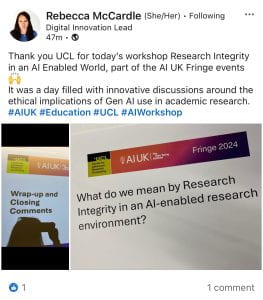Research Integrity in an AI-Enabled World
By Samantha Ahern, on 5 April 2024
Over the last 15 months there has been much debate, hype and concern relating to capabilities of tools and platforms leveraging Large Language Models (LLMs) and media generators. Broadly termed Generative AI. The predominant narrative in Higher Education has been around the perceived threat to academic integirty and associated value to degrees. As such a lot of focus and discussion has focused on taught students, assessment design and “AI-proof” assessment. This has been coupled with concerns relating to the inability to reliably detect generated content, and the disproportionate number of false positives related to non-native English speakers text submitted to various platforms.
 However, despite the proliferation of Generative AI enabled research tools and platforms, numerous workshops offering increased research output productivity and publications asking authors to declare whether or not these tools were used in producing outputs there has been limited discussion with relation to staff and research integrity.
However, despite the proliferation of Generative AI enabled research tools and platforms, numerous workshops offering increased research output productivity and publications asking authors to declare whether or not these tools were used in producing outputs there has been limited discussion with relation to staff and research integrity.
Coupled with the publication of initial findings from a study on staff use of these tools by Watermayer, Lanclos and Phipps that included use to complete “little things like health and safety stuff, or ethics, or summarizing reports” and potential safety risks from fine-tuning models as reported in the Stanford Univeristy published policy briefing Safety Risks from Customizing Foundation Models via Fine-Tuning a workshop focusing on the interplay of Generative AI and research integrity and ethics was proposed as an AIUK Fringe event.
Research Integrity in an AI-Enabled World took place on Monday 25th March 2024. The aim was to explore how we think Generative AI enabled tools and platforms, could and should impact on the research process, and what the integrity and ethics implication are. Eventually aim would be to produce a policy white paper.
The event was organised so that there was a series of thought provoking talks in the morning, followed by a world-cafe style session in the afternoon. The event was held under the Chatham House Rule to enable open and frank discussion of the topic and arising issues.
The first set of talks predominantly focused on ethical issues. There were discussions on authorship, and the nature of authorship where multiple actors are involved e.g. training data creators, platform developers and prompters. Bias in image generation, reinforcing misconceptions and stereotypes. Culminating in a talk on the University of Salfords evolving approach to Generative AI and research ethics.
The second set of talks was focused on current capabilities, limitations and implications of using Generative AI enabled tools in the research pipeline, predomintly focusing on qualitative analysis. This session included a discussion around evidence synthesis and the need to find more efficient methods whilst maintaining reliability and a breadth of knowledge, and different approaches using “traditional” machine learning approaches versus use of large language models. Enhanced capabilities of Computer Aided Qualitative Data Analysis Systems and implications for methodological approaches were also introduced and discussed. The session concluded with a talk from Prof Jeremy Watson about the work currently being undertaken by the UK Committee on Research Integrity’s AI working group, of which he is member. Key themes currently under consideration by UKCORI are:
- Governance
- Roles and Responsibilities
- Skills and Training
- Public Understanding and Expectations
- Attribution and Ownership – IP, etc.
- Understanding Data Inputs and Models
- Need for Research in AI and Integrity
During the world-cafe session participants addressed the following questions:
- What do we mean by Research Integrity in an AI-Enabled Research Environment?
- Are there degrees of Research Integrity based on discipline and how embedded AI use is in the research process?
- What are the key ethical and legal considerations?
Including the following participant proposed questions:
- Generative AI is extremely good at in-filling uncertainty, where details of images become filled with bias. Should the responsibility of bias be equally on a prompter who enables this by omission?
- Recalibration of government and private funded RI in AI? Isn’t this the foundation of biases for RI?
Outputs from the world cafe session will be analysed over the next few weeks, and workshop participants were invited to contribute to the development of workshop outputs.
Key themes that emerged from the event include:
- Transparency
- Criticality
- Responsibility
- Fitness for purpose
- Data protection and privacy
- Digital divide – privilege and harms
- Training – education
 The workshop was well received by participants, with the participants rate their overall experience of the event as 4.71 out of 5.
The workshop was well received by participants, with the participants rate their overall experience of the event as 4.71 out of 5.
The speaker sessions were rated as very good by over 70% of participants. With the world cafe being mentioned as a highlight of the event.
As the proposer, organising and the host of the event I can’t help but still wonder:
- Can we ethically and with genuine integrity use tools which are fundamentally ethically flawed?
- Why are we accepting of these issues?
- How should we be pushing back?
I will leave you with these words from Arudhati Roy with which I opened the event:
 Close
Close

